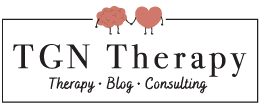Therapy
Therapy is a confidential space where individuals have the opportunity to speak with a licensed professional about personal experiences, feelings, and thoughts, free of judgment.
Therapy can assist individuals with gaining insight and awareness into past experiences, current challenges, and barriers, as well as developing new coping skills.
Types of Therapy
Individual, Couples, and Family
Please refer to each clinician’s experience, as not all clinicians provide every type of therapy.

Getting Started
Screening & Consultation: each incoming referral will be screened by our awesome office manager, Rebecca. Thereafter, Rebecca will schedule you for your complimentary 15-minute consultation via telephone.
The purpose of the consultation is for you and your therapist to learn a little bit about each other, make sure it is a good fit, and answer applicable questions. If both the patient and the clinician agree to move forward, you will be scheduled for an intake.
Assessment/Intake Session (45-60 miniutes): one of our clinicians will conduct a complete mental health assessment. This information helps to inform treatment, so that we can best support you in the in the therapeutic setting.
Typically, the formal assessment takes 1-3 appointments to complete, but you are only ever charged the assessment fee one time. After the one-time assessment charge, the fee drops to the standard therapy rate.
Subsequent Therapy Sessions (45-50 minutes): After the intake is completed, you will work on building rapport with your clinician and targeting your specific treatment goals.
Therapy Fees
- Licensed Clinician Fees
Assessment/Intake Session (45-60 minutes): $275
Standard/Subsequent Sessions (45-50 minutes): $225 - Associate Clinician Fees
Assessment/Intake Session (45-60 minutes): $225
Subsequent Sessions (45-50 minutes): $175
What’s the difference between a licensed and associate clinician?
Our Specialties
- Anxiety
- Depression
- Neurodiversity
- ADHD
- Trauma
- Grief/Bereavement
- Spousal loss
- Familial loss
- Perinatal and Reproductive Mental Health
- Paternal Mental Health
- Pregnancy, Postpartum, PMADs
- High-Risk Pregnancies
- Birth Trauma
- Pregnancy/Infant Loss, Miscarriage, Stillbirth, TFMR, Recurrent Loss, Child Loss
- TTC after loss, PAL (pregnancy after loss)
- NICU Families
- Infertility (primary and secondary)
- Pregnancy after infertility
- Surrogacy
- Donor Conception
- Pro-Choice support for reproductive health
- Women’s Health
- Women’s health throughout the lifespan
- Men’s Health
- Adoption
- Parenting
- Co-Parenting
- Grief
- Life Transitions
- Educational/Occupational
- Healthcare Workers
- High-Achievers
- Professionals
- Relational Conflict
- Communication
- Boundaries
- Coping Skills
- HSPs (highly sensitive persons)
- LGBTQ+ Affirmative
- Children/Adolescents
- Couples
- Infidelity
- Intimacy
- Sexual/Romantic Intimacy
- Discernment Counseling
- Families
- Cancer and Chronic Illness
- Medical Trauma
- Self-Esteem
- Family Conflict
- Caregivers
- Immigrants and Refugees
- Race, Culture, Ethnicity, Religion, and Spirituality
- Sports Performance Psychology
- Dysregulation
- Childhood Trauma/Experiences
- Anger
- Negative Thoughts

